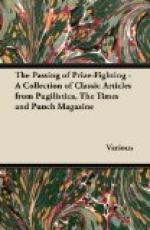Further protests against the mutilation of the Dardanelles Report were made by Sir WALTER ESSEX, Sir CHARLES HOBHOUSE, and Sir JOHN JARDINE. Free disclosure to all Members of Parliament, and no preferential treatment of party-leaders, was their demand. Mr. BONAR LAW manfully resisted their assaults, and the SPEAKER declined to accept a motion for the adjournment. A word from Mr. ASQUITH would no doubt have quelled the storm, but as one of the favoured few who are to receive the full Report he felt himself, I suppose, precluded from saying it. The late Mr. LABOUCHERE would probably have suggested that the difficulty should be solved, on the analogy of a famous edition of MARTIAL, by issuing the Report as expurgated, together with an appendix containing all the omitted passages. But there is no LABOUCHERE in the House to-day—more’s the pity.
What Mr. HOGGE does not know about pensions is not worth knowing. He has already made havoc of more than one Government scheme, and unless he has an official ring put in his nose he will evidently do his best to upset the latest of them. On the whole, however, Mr. BARNES’S exposition of the new pension scheme was well received. Though not unduly generous—that would be impossible in the circumstances—it will at least, as Capt. STEPHEN GWYNN put it, “enable us to look disabled men in the face.”
Wednesday, March 7th.—Lords SHEFFIELD and PARMOOR are much disturbed because British subjects have been interned without trial, and had to be reminded by the LORD CHANCELLOR that there was a war in progress, and that it was better that individuals should lose a portion of their liberties than that the community should lose them altogether.
A full appreciation of this truth might have prevented the Irish Nationalists from seeking at this moment to get Home Rule out of cold storage. If the attempt had to be made Mr. T.P. O’CONNOR was not perhaps the best person to make it. For over an hour he meandered through the more melancholy episodes of Irish history, from the Treaty of Limerick to the Easter Monday rebellion, rather in the manner of one of those film-dramas of which he is now the Censor. I am afraid his endeavour to prove that Ireland is not “an irrational country, demanding impossible things,” was not entirely convincing.
It failed, at any rate—although backed by a brief appeal by Major WILLIE REDMOND, which touched the House by its manifest sincerity—to convince the PRIME MINISTER that this was the accepted time for plunging Ireland once more into civil strife. Those parts of Ireland that wanted Home Rule could have it to-morrow if they wished; neither he nor any other British statesman would force the people of N.E. Ulster under a government they disliked. When those two facts were thoroughly understood there might be a chance of a settlement.
[Illustration: A TRUE IRISHMAN.
Mr. John Redmond. “I’VE FINISHED WITH THE BRITISH EMPIRE—




